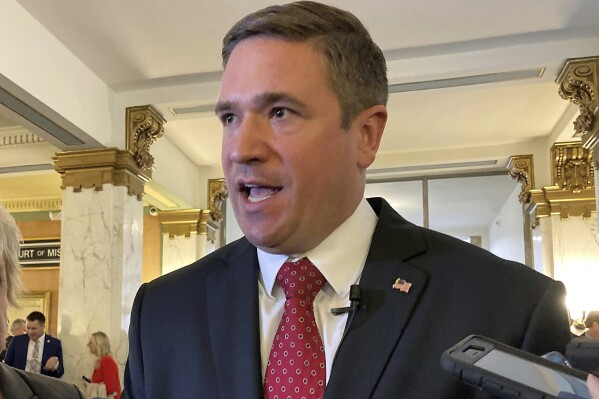Missouri’s GOP attorney general sues school for closed-door debate on transgender bathroom use
COLUMBIA, Mo. (AP) — Missouri’s Republican attorney general on Tuesday sued a school district for allegedly secretly discussing transgender students’ bathroom access, in violation of the state’s open-meeting law.
The lawsuit by Republican Attorney General Andrew Bailey, who is campaigning to keep his seat in 2024, claimed a suburban St. Louis school board went into a closed session to talk about a student’s request to use a different bathroom.
Debate during the closed portion of Wentzville’s June 14 Board of Education meeting veered from legal advice and details on the student request to broader policy discussions, board members Jen Olson and Renee Henke wrote in affidavits provided by Bailey’s office.
Olson and Henke claimed members considered whether there should be exceptions for notifying parents when students request bathroom accommodations, such as in cases of parental abuse.
 A judge has rewritten Missouri ballot summary language that described ‘dangerous’ abortions
A judge has rewritten Missouri ballot summary language that described ‘dangerous’ abortions
 More schools are adopting 4-day weeks. For parents, the challenge is day 5
More schools are adopting 4-day weeks. For parents, the challenge is day 5
 Missouri says clinic that challenged transgender treatment restrictions didn’t provide proper care
Missouri says clinic that challenged transgender treatment restrictions didn’t provide proper care
Missouri’s Sunshine Law requires school board meetings to be open to the public. There are some exceptions, including for legal matters, but any other debate must be public.
“Parents have the right to know who is in the bathroom with their children,” Bailey said in a statement. “Members of the Wentzville School Board knowingly and purposefully denied parents that right when they shrouded the transgender student bathroom usage policy in secrecy, directly violating the Open Meetings Law.”
The Wentzville School District in a statement said it has not yet been served with the lawsuit but takes the issue seriously.
“The Board of Education has adopted policies that demonstrate its commitment to Missouri Sunshine Law compliance and strives to faithfully adhere to those policies and the law,” according to the statement.
Olson and Henke said they were among members who spoke against discussing restroom access in closed session, arguing that the topic should be considered publicly. They said debate continued anyway.
Associated Press emails seeking comment from all seven board members were not immediately returned Tuesday.
Bailey also alleged that members who spoke against the closed-door discussions faced retaliation under a new ethics policy proposed last week.
The policy would require board members to avoid comments that could be interpreted as “undermining” the administration and “disparaging remarks” about other members, the superintendent or staff.
Bailey’s lawsuit comes amid a wave of Republican-led efforts to put restrictions on transgender people’s access to sports, bathrooms and health care.
A new Missouri law, which took effect Aug. 28, outlawed puberty blockers, hormones and gender-affirming surgery for minors. There are exceptions for youth who were already taking those medications before the law kicked in, allowing them to continue receiving that health care.
At least 10 states have enacted laws over bathroom use, including North Dakota, Florida and Kansas. Missouri is not one of them, instead leaving policy debate to local districts.
Supporters argue that bathroom laws protect the privacy of cisgender women and girls. They have also pitched the laws as safety measures, without citing evidence of threats or assaults by transgender people against cisgender women or girls.
“The stance that (Wentzville School District) takes is to protect all students,” Henke wrote in a July 27 email to other school administrators. “How does allowing a male into the female restroom protect all students?”
Disclaimer: The copyright of this article belongs to the original author. Reposting this article is solely for the purpose of information dissemination and does not constitute any investment advice. If there is any infringement, please contact us immediately. We will make corrections or deletions as necessary. Thank you.





